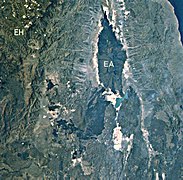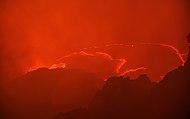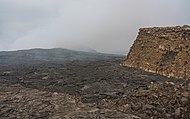Erta Ale
| Erta Ale | |
|---|---|
 Erta Ale in May 2008 | |
| Highest point | |
| Elevation | 613 m (2,011 ft)[1] |
| Listing | List of volcanoes in Ethiopia |
| Coordinates | 13°36′23″N 40°39′41″E / 13.60639°N 40.66139°E |
| Geography | |
| Parent range | Erta Ale Range |
| Geology | |
| Mountain type | Shield volcano |
| Last eruption | 2005 to 2020[2] |
Erta Ale (or Ertale or Irta'ale; /ˈərtə ˈeɪl/ Amharic: ኤርታሌ) is a continuously active basaltic shield volcano in the Afar Region of northeastern Ethiopia, which is itself part of the wider Afar Triangle (a barren desert region straddling Djibouti, Ethiopia and Eritrea). The volcano is located in the Danakil Depression, an area on the border between Ethiopia and Eritrea that is below sea level. It is the most active of the volcanoes in Ethiopia.[3]
Geology
[edit]Erta Ale is 613 metres (2,011 ft) high, with one or sometimes two active lava lakes at the summit which occasionally overflow on the south side of the volcano.[1] It is notable for holding the longest-existing lava lake, present since at least 1906.[4] Volcanoes with lava lakes are rare: there were only eight in the world reported in 2019.[5]
Erta Ale means "smoking mountain" in the local Afar language and its southernmost pit is known locally as "the gateway to hell". In 2009, it was mapped by a team from the BBC using three-dimensional laser techniques,[6] in order for the mapping team to maintain a distance and avoid the lakes' searingly hot temperatures.
Erta Ale is located in the Afar triple junction where three tectonic plates split apart: the African plate, the Arabian plate and the Somali plate. Specifically, it lies almost at the end of the southern Red Sea rift, where tectonic extension (via normal faults) proceeds in conjunction with igneous intrusions to generate a new oceanic crust between Africa and Arabia.[7] The volcano comprises mainly mafic lavas which were brought up to the surface by dike emplacement during a rifting event.[8]
A major eruption occurred on 25 September 2005 which killed 250 heads of livestock and forced thousands of nearby residents to flee.[9] There was further lava flow in August 2007, forcing the evacuation of hundreds and leaving two missing.[10] A new eruption started in November 3, 2008 at the Alu-Dalafilla volcanic centre, at the northern end of the Erta Ale range.[11][12] The latest eruptive activity started in January 2017,[13] with outpouring of lava flows extending for kilometers from the vent, and lasted until March 2020; volcanic pulses have occurred since that time,[14] lasting until at least April 2024.[15][16]
-
View of Erta Ale from the base camp
-
Erta Ale volcano (EA) and Ethiopian Highlands (EH) as seen from space
-
The lava lake in the caldera of Erta Ale
-
The lava lake's activity in January 2018
-
Dry lava field on the top
Tourism
[edit]
Erta Ale is the most regularly visited volcano in the Danakil Depression.[17] However, not much is known about the volcano, and the surrounding terrain is some of the most inhospitable on Earth, making travel difficult and dangerous. The Afar region also experiences intermittent ethnic violence due to unification struggles by the native Afar people. On January 17, 2012, a group of European tourists was attacked at Erta Ale. Five tourists were killed, two taken as hostages and seven others wounded.[18] The Afar Revolutionary Democratic Unity Front (ARDUF) claimed responsibility for the attack[19] and released the two kidnapped tourists in March 2012.[20] One travel guide recommends hiring "one or maybe two armed guards or police" as guides to visit Erta Ale.[21] Commercial tour companies offer tours to Erta Ale which are generally accompanied by military escort.
In December 2017, a German tourist was fatally shot while descending Erta Ale.[22]
In popular culture
[edit]Erta Ale was featured in the episode "Volcano" of the 2008 documentary series Earth: The Biography. The lava lake on Erta Ale was shown briefly during the 2010 movie Clash of the Titans during the journey sequence where Perseus travels to the underworld. Erta Ale is featured in the 2016 Werner Herzog documentary, Into the Inferno.
See also
[edit]References
[edit]- ^ a b "Erta Ale, Ethiopia". Volcano World. Oregon State University. Retrieved 2007-08-08.
- ^ "Erta Ale volcano". 12 June 2019.
- ^ "Global Volcanism Program | Erta Ale". Smithsonian Institution | Global Volcanism Program. Retrieved 2023-07-04.
- ^ Barnie, T.D., Oppenheimer, C., and Pagli, C. (2016). Magmatic Rifting and Active Volcanism. Geological Society, London, Special Publications, 420, 181–208. https://doi.org/10.1144/SP420.15
- ^ "Rare lava lake discovered on remote island is one of only eight". CNN. 4 July 2019. Retrieved 5 July 2019.
- ^ Hottest Place On Earth, Episode 2 at bbc.co.uk
- ^ Hurman, G.L., Keir, D., Bull, J.M., McNeill, L.C., Booth, A.D., and Bastow, I.D. (2023). Quantitative analysis of faulting in the Danakil Depression Rift of Afar: The importance of faulting in the final stages of magma-rich rifting. Tectonics, 42, e2022TC007607. https://doi.org/10.1029/2022TC007607
- ^ Moore, C., Wright, T., Hooper, A., & Biggs, J. (2019). The 2017 eruption of Erta 'Ale Volcano, Ethiopia: Insights into the shallow axial plumbing system of an incipient mid-ocean ridge. Geochemistry, Geophysics, Geosystems, 20, 5727–5743. https://doi.org/10.1029/2019GC008692
- ^ "Focus on Ethiopia, September 2005" Archived 2010-10-05 at the Wayback Machine, UN-OCHA . Retrieved 25 February 2009.
- ^ "Fears after volcano in Ethiopia". BBC News. 2007-08-15. Retrieved 2007-08-15.
- ^ Volcano erupts in Ertale volcanic area of Afar Region Archived 2010-04-26 at the Wayback Machine, Ethiopian News Agency website. Retrieved January 20, 2010.
- ^ Pagli, C., Wright, T., Ebinger, C. et al. Shallow axial magma chamber at the slow-spreading Erta Ale Ridge. Nature Geosci 5, 284–288 (2012). https://doi-org.insu.bib.cnrs.fr/10.1038/ngeo1414
- ^ "New flank eruption at Erta Ale volcano, Ethiopia". The Watchers – Daily news service | Watchers.NEWS. 25 January 2017. Retrieved 2017-05-14.
- ^ Crafford, A.E.; Venzke, E., eds. (May 2022). "Report on Erta Ale (Ethiopia)". Bulletin of the Global Volcanism Network. 47 (5). Smithsonian Institution. doi:10.5479/si.GVP.BGVN202205-221080.
- ^ Global Volcanism Program: Erta Ale, Eruptive History. Retrieved April 20, 2024.
- ^ Volcano Discovery: Erta Ale volcano. Retrieved April 20, 2024.
- ^ Briggs, Philip; Blatt, Brian (2009). Ethiopia. Bradt Travel Guides. p. 311. ISBN 9781841622842.
- ^ "Deadly attack on tourists at Erta Ale – further details: 5 dead, 4 abducted and 7 wounded". VolcanoDiscovery. 18 January 2012. Retrieved 26 October 2013.
- ^ "Erta Ale Janurary [sic] 17 kidnapping – ARDUF claims responsability [sic], hostages said to be well". VolcanoDiscovery. 20 February 2012. Retrieved 26 October 2013.
- ^ "Kidnapped German tourists released (Erta Ale, Danakil, Ethiopia incident 17 Jan 2012)". VolcanoDiscovery. 6 March 2012. Retrieved 26 October 2013.
- ^ Briggs, Philip; Blatt, Brian (2009). Ethiopia: the Bradt Travel Guide (Fifth ed.). Chalfont St Peter: Bradt Travel Guides. p. 313. ISBN 978-1-84162-284-2.
- ^ Berhane, Daniel (2017-12-05). "An armed group from Eritrea kills a German in Erta Ale, Ethiopia". Horn Affairs. Retrieved 2017-12-07.
External links
[edit]- Photos from an expedition in Nov and Dec 2009
- Photos from an expedition to Erta Ale and the Danakil in Feb. 2008
- (in French) Photos of Erta Ale: Expedition Nov 2006
- BBC article about Erta Ale
- Photographs of Erta Ale, February 2015






